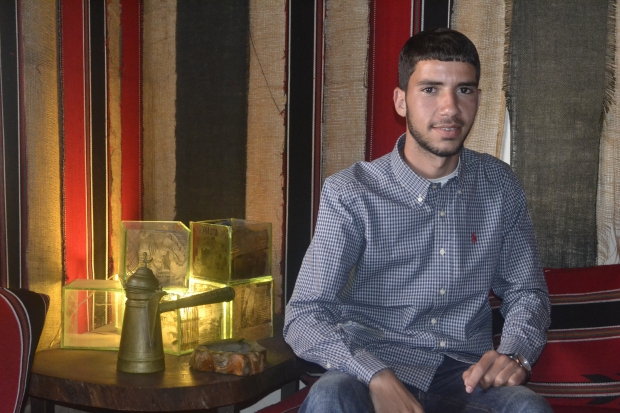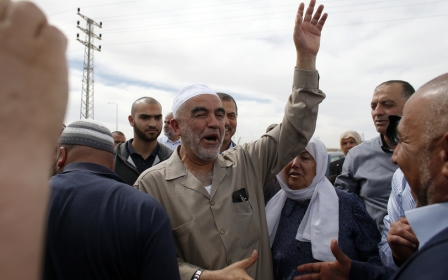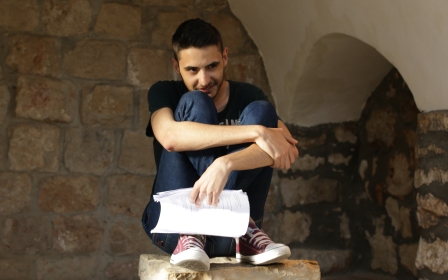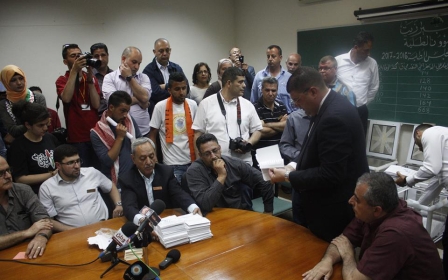Palestinian student leaders facing jail for opposing occupation
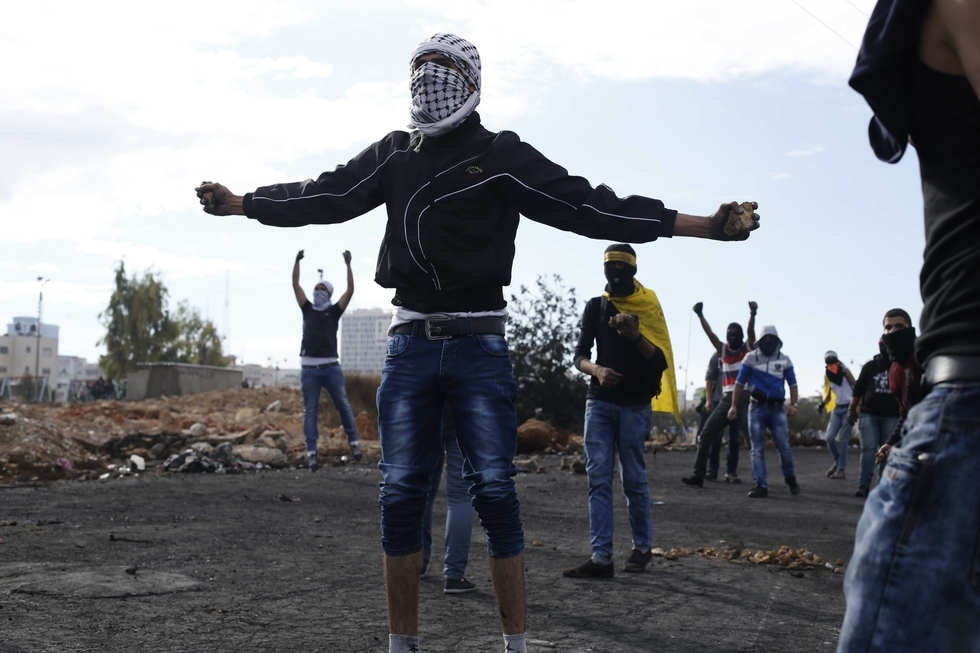
RAMALLAH, Occupied West Bank - Students at Palestine’s leading university will choose their new president on 16 May, after recent elections in which a Hamas-linked bloc won a majority of seats, but a prominent student activist says their new leader will almost certainly be imprisoned by Israeli authorities.
The three men and two women who make up Birzeit University’s student council have faced no problems in finding candidates to become the new president, despite incumbent Saif Islam Ghaghlas being held without charge in an Israeli prison since December last year.
Ghaghlas is one of 90 students, one university employee, and two instructors from Birzeit who are all currently in Israeli prisons, according to a university statement, which said the detentions were an attack on the “right to education”.
The Hamas bloc’s recent victory at Birzeit may be one reason why Israeli authorities have arrested scores of the university’s students, with Israeli government spokesperson Ofir Gendelman saying after the elections that students were “mimicking ISIS [IS]” during one campaign rally.
Birzeit has a richly diverse student body, with young Palestinians coming from all over the occupied West Bank to study there, which is why when it holds its annual student elections many look to it as a measure of Palestinian public opinion.
For the second year running, on 26 April the Wafaa’ Islamic Bloc, which is informally linked to Hamas, won a plurality of seats in the vote, this year securing 25 out of 51 available. Fatah, the party that dominates the Palestinian Authority (PA), came second with 21 seats, via its affiliate, the Martyr Yasser Arafat Bloc.
While the Wafaa’ Islamic Bloc has no official ties to the Hamas leadership, because of a ban imposed both by Israeli and Palestinian authorities, it considers itself part of the Hamas movement and is referred to as Hamas both on the university website and by local media.
Tariq Rabea’, a leader of the Wafaa’ Islamic Bloc, told Middle East Eye that their victory at Birzeit gives the Hamas movement a belief that they would win a long overdue general election in the occupied territories – the last vote was held in 2006 and was won by Hamas but led to violent clashes with its rival Fatah, ending with Hamas governing in Gaza and Fatah effectively taking charge of the West Bank.
“Winning the elections gives us the feeling that if we have a free election Hamas would have a good chance to win,” he said, during in an interview at a coffee shop in Ramallah.
Rabea’, an accounting student with a softly spoken manner, is just 22 years old but he has already spent two years inside Israeli prisons, as well as being arrested for his political activism by Palestinian authorities more times than he can remember.
Rabea’ is at the heart of student politics at Birzeit, and since being released by Israel just a few days after last year’s elections, he has played a key role coordinating between the university and the various political groups on campus.
Sitting in a quiet cafe above a bustling Ramallah street below, Rabea’ argued that the reasons behind Hamas’s victory at Birzeit represent how the group, which is widely known for its socially conservative policies in governing Gaza, should be viewed as more than an Islamist movement.
He said that Birzeit has students “coming from different backgrounds from all over Palestine” many of whom - he claimed - supported Hamas in the recent election because of their stance towards the ongoing Israeli occupation.
“People vote for Hamas because of its plan for resistance,” he said, with the furtiveness of someone who knows his political views could see him rearrested at any moment.
“Hamas’s priority is resistance. Their way is to use military means and not just the peaceful ways [the Palestinian Authority] are trying to impose on us.”
Rabea’ argued that at Birzeit Hamas was “not just about Islam”, and he added that the group had sought to ensure all students felt able to join in with activities on campus.
“If you want to find Islam, you will find it – there are Quran classes,” he said. “But you can’t say a vote for Hamas is a vote for Islamism.
“We have events for Christians, members of Fatah, and for people from the left.
“The university is very diverse so we have to deal with this reality and to give space and a place for everyone.”
Rabea’ said that the Birzeit university group has demonstrated how Hamas was able to adapt to its political environment with the aim of best representing Palestinian “resistance”.
Whether or not the student election represents Palestinian public opinion is another matter, however; a poll in April by the Palestinian Centre for Policy and Survey Research showed support for Hamas at 33 percent whereas Fatah polled at 34 percent.
Support for Hamas rises significantly when it comes to the presidency, with 64 percent of Palestinians wanting President Mahmoud Abbas to resign, and 52 percent of people wanting Hamas leader Ismail Haniyeh to replace him.
The poll also showed that a majority of Palestinians – 58 percent – support a wave of stabbing attacks by Palestinians against Israelis, which have been part of an increase in violence since October last year that has seen 203 Palestinians and 28 Israelis killed.
Rabea’ told MEE that he could understand stabbings being a tool of “resistance” but he urged young Palestinians to think twice before doing something that could see them killed.
“To the youth who are thinking about going to stab, I say wait, grow, and learn more first,” he said, referring to the high number of young Palestinians who have been killed while attempting to attack Israelis.
Rabea’ said that Birzeit students have widely supported what he described as an intifada, or uprising, but that the PA had shut down their daily protests at the nearby settlement of Beit El.
“The students would go and clash with the [Israeli] soldiers everyday after class,” he said. “But in December the PA stopped us.”
The PA’s actions, he said, may have contributed to the university election result, as many students believe Fatah doesn’t support a new Palestinian uprising, whereas Hamas has actively encouraged them to go out and rally.
“People are also disappointed with Fatah’s failed negotiations [with Israel],” he added. “We view them as being corrupt while most students think Hamas isn’t corrupt.”
But it isn’t all about big political ideas.
The Wafaa’ Islamic Bloc also provides pastoral and financial support for Birzeit students who have disputes with the university as well as helping students buy the books they need, something that is also done by the Martyr Yasser Arafat Bloc.
The passion with which Rabea’ spoke about the election at his university clearly represented the vibrant and open nature of student politics at Birzeit. However, the discussion of student politics takes place within a context that includes the current president, along with scores of other students, continuing to languish in Israeli prisons.
While the allegations against those detained are unclear, Rabea’ argued that they are being held simply for their political activities in support of “resistance” – be it violent or non-violent.
But despite the threat of arrest, or, according to Rabea’, the inevitability of imprisonment, whoever is named Birzeit’s new student president on 16 May will have fought off stiff competition to be the new leader.
“There’s a competition,” he said. “Lot’s of people want to do it."
The leading candidates were not identified by Rabea', however, he said that the student council had wanted to appoint a woman as president, but had decided against it because of the inevitability of them being arrested.
That said, Rabea' was keen to stress that the vast majority of Birzeit students - and Palestinan youth in general - are more than happy to go to prison if they have to.
“The students want their freedom, which means reclaiming the land that Palestine has lost. This is our historical right and this can’t be taken away from us even if our physical freedom is.”
New MEE newsletter: Jerusalem Dispatch
Sign up to get the latest insights and analysis on Israel-Palestine, alongside Turkey Unpacked and other MEE newsletters
Middle East Eye delivers independent and unrivalled coverage and analysis of the Middle East, North Africa and beyond. To learn more about republishing this content and the associated fees, please fill out this form. More about MEE can be found here.


